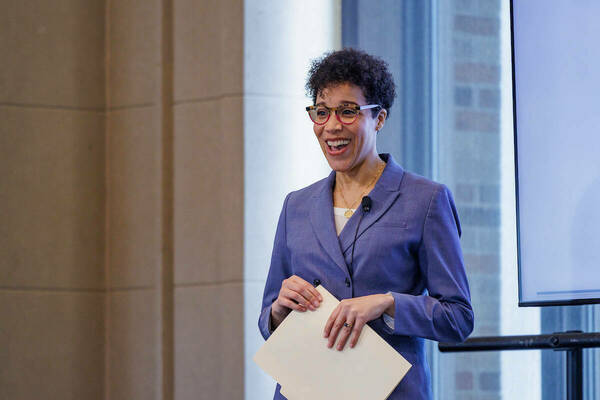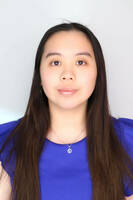This profile is part of a series of interviews with Notre Dame faculty and staff conducted by office assistants within the Transformational Leaders Program.

Q: What is your title and how long have you been with the University?
A: My title is associate director of strategic initiatives and senior advisor to the vice president of institutional transformation, and I have been with the University for nine years. We had a very decentralized approach (to DEI work) in the past. So what our office does is coordinate efforts to centralize the approach for diversity and inclusion.
Q: How do you spend your spare time? Do you have any hobbies or do you belong to any social organizations outside of Notre Dame?
A: Ever since I was little, I played the flute, guitar, oboe, and bass and loved it. When I was nine, I even started a band. I also love to cook and some of my favorite dishes that I would make are fusion dishes between European and South American flavors. I also like to travel a lot.
Q: You mentioned you’ve been at Notre Dame for nine years, what other roles at the University did you have prior to your current position?
A: Starting off with TRIO (a federal outreach program for college access), the initial chapter of my journey, I've been on a diverse career ride. Currently, I'm diving deep into the Office of Institutional Transformation, where the focus is on catalyzing change and progress. Previously, my roles included navigating the intricacies of the Office of Institutional Equity, steering fundraising campaigns in development, and curating online content for the Grotto Network to keep the younger crowd engaged with the church. In the tech world, I played a key role in the Office of Information Technology, driving change management and strategic planning for major implementations. I've also stepped into the academic sphere, joining the faculty in the College of First Year Studies within the College of Science. I also had a stint in Human Resources, advocating for diversity and inclusion. Now, in the latest chapter, I'm fully immersed in the dynamic landscape of the Office of Institutional Transformation.
Q: What are the main responsibilities of your current role?
A: My responsibility is to help Notre Dame become the best version of what it could be and make it a place where everyone can feel a sense of belonging and allow each one of us to thrive.
Q: In your current role, do you have the chance to collaborate with other Notre Dame departments? If so, how do you get to collaborate?
A: In my current role, collaboration is at the core of what we do. I have the privilege of working closely with various departments across Notre Dame. We brought back the Diversity Practitioners Group, which is a collective effort involving 150 members from different parts of the university, and our bi-monthly meetings provide a platform for us to collaboratively develop and implement best practices. While the work can sometimes feel isolating, particularly given the specific responsibilities we bear for students of color, we stress the importance of a shared responsibility for fostering equity and a sense of community warmth at Notre Dame. Additionally, our engagement with students is crucial; it's a continuous dialogue to make sure we understand their needs and experiences.
Q: Generally or specifically, are there any things that Notre Dame can improve upon? If yes, please describe those things.
A: I believe that Notre Dame holds a unique place with deep family legacies and connections. However, as we strive for greater diversity and inclusion, there's a recognition that not everyone comes in with those familial ties. It's a bit like navigating a foreign country; we assume people know the rules and have a rough guide to Notre Dame, which might make them feel like they're missing out. The goal is for our office to create a roadmap, providing support not only for students but also for faculty. The distinction between being a "Domer" and not can also be significant, especially for those who may not have parents with a Notre Dame education. Sometimes, these aspects can be taken for granted.
Another area for improvement is our connection with the South Bend community. While there are ample opportunities, there's a recognition that we haven't fully engaged with what our mission calls us to do. We're making strides, but there's an acknowledgment that we're playing catch-up compared to other universities that have been more proactive in this.
Q: What are the most meaningful aspects of your current role? Why are they meaningful?
A: In my current role, the meaningful part is having the opportunity to operate at an institutional level, figuring out ways to enhance the overall experience for everyone. Unlike my previous work, which involved one-on-one interactions and resolving individual problems, my focus now is on a holistic and structural approach to bring about broader improvements. It's a shift from fixing isolated issues to looking at the bigger picture, aiming to make things even better on a comprehensive level.

Kenna Bonde, ’25, is a Transformational Leaders Program (TLP) scholar who also works as a TLP office assistant. She interviewed Eve Kelly for the TLP Weekly Updates e-newsletter. TLP—a leadership development program focused on academic accompaniment, community building, and opportunity coordination—provides Bonde and other office assistants the chance to enhance their professional skills , partner with TLP team members, and support the work of the program. Learn more about TLP.